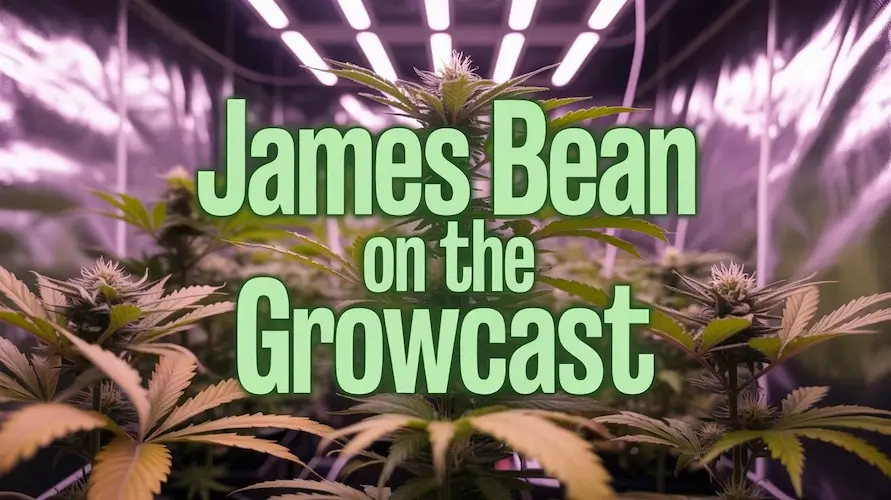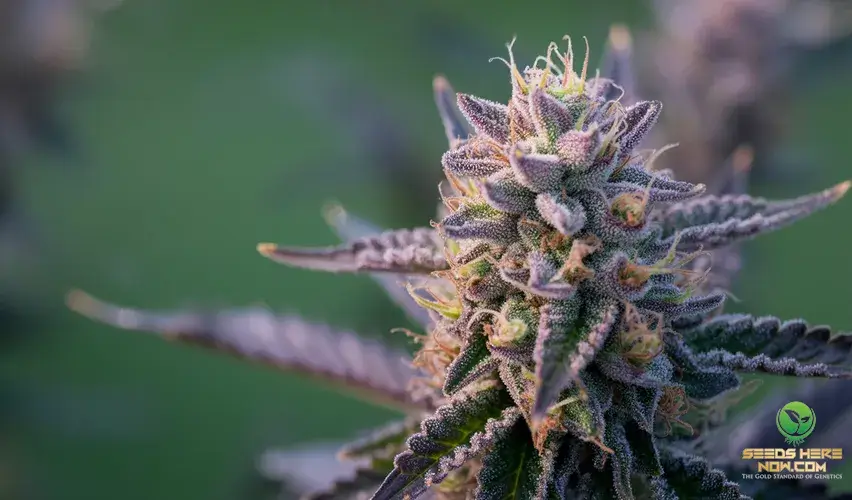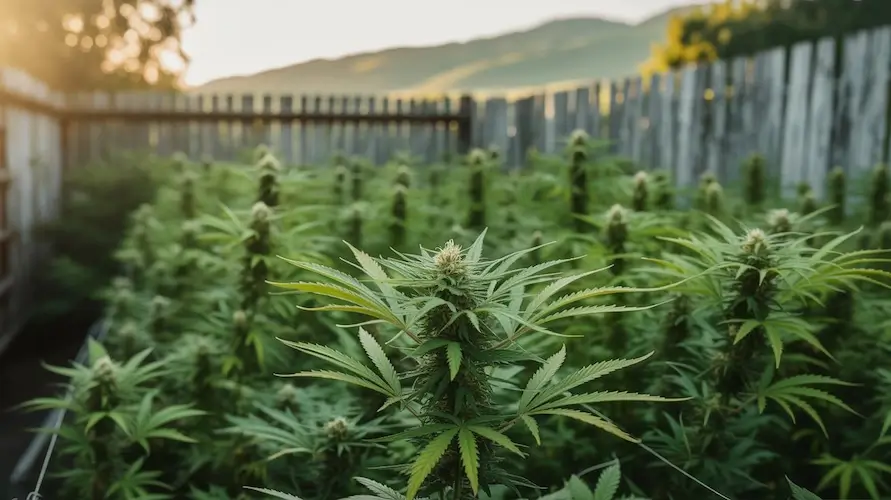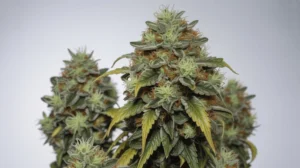James Bean on Big Breeder Collabs, Strain History, Cannabis Scams, and More

When it comes to the cannabis seed world, few names carry the weight and respect that James Bean does. Founder of Seeds Here Now, James has been a pivotal player in the cannabis genetics scene for over a decade. His deep connections with old-school breeders, his firsthand experience with the highs and lows of the cannabis industry, and his no-nonsense approach to seed selling make his story one you don’t want to miss.
In an eye-opening interview with GrowCast’s Jordan River, James breaks down the evolution of cannabis breeding, the challenges of running a seed bank, the drama behind breeder collaborations, and even the wild world of international banking scams. Whether you’re a budding home grower, a cannabis business owner, or just a fan of the plant’s rich history, James Bean’s insights provide a rare behind-the-scenes look at the cannabis genetics game.
Table of Contents
- From DJ to Seed Broker: The Origin Story of James Bean
- Honoring the Breeders: Old School Legends and Industry Evolution
- The Copycat Conundrum: Genetics, Theft, and Licensing
- Breeder Beef and the Politics of Seeds
- GrowCast Classes: Sharing Knowledge and Empowering Growers
- Global Cannabis Markets and the Nightmare of Merchant Processing
- Final Shoutouts: The People Behind the Seeds
- Where to Find James Bean and Seeds Here Now
- Conclusion: The Seed Broker’s Perspective on Cannabis Culture
From DJ to Seed Broker: The Origin Story of James Bean
James didn’t start his journey in cannabis genetics in a lab or a grow room. He was a career DJ for over a decade, spinning underground techno and EDM tunes before the Skrillex-era “noise” took over. Around 2010, as the EDM scene shifted and his passion waned, a friend introduced him to the world of cannabis breeding.
This friend, an avid breeder with a solid back catalog of strains, was struggling to sell seeds. James, a natural salesman, saw an opportunity. He teamed up with his friend, leveraging his sales skills to push those genetics into the market. That partnership marked the birth of what would become Seeds Here Now.
By 2012, James was deep into the burgeoning Seattle cannabis scene. He recalls buying Cookies clones for $2,500 apiece in a Sacramento, CA, Safeway parking lot—a price that sounds absurd today but was standard back then. He brought those up to Washington State, nurtured them into robust plants, then stripped them for cuttings, selling thousands of clones at around $1,000 each. It was a grind, and the market was flooded quickly, causing prices to plummet.
Seattle was a dispensary gold rush at the time. James notes that there were more dispensaries than Starbucks—over 280 of them! This intense competition drove prices down fast. Dispensaries were flooded with genetics, and growers and sellers had to hustle hard to stay afloat.
The Early Seed Hustle: Building from the Ground Up
James started by signing contracts exclusively with his original breeder friend and then began acquiring state-specific seed bank domains as new states legalized cannabis. He ended up owning seedbank.com URLs for every state that legalized, forwarding them all to SeedsHereNow.com. The original plan was to franchise these domains to representatives in each state, allowing localized branding and sales tracking, but the landscape evolved differently.
He shares a funny anecdote about buying and selling URLs, including one back to Mike (Cadillac Mike from Exotic Genetix) for the exact price he paid—no markup. James clearly understands the value of digital real estate just as much as genetics.
Hustling door-to-door with seed packs in hand, James tried selling to dispensaries, but initial sales were slow because ten-pack seed packs were expensive for consumers used to buying clones. The solution? Break the packs into smaller five-packs at $50 each—equivalent to buying two clones but with the advantage of genetic diversity and the ability to grow your own unique plants.
Back then, everything was regular seeds, meaning about half the seeds would be male, and feminized seeds weren’t popular due to hermaphroditic issues. Autos were a no-go until around 2014-2015. James describes early autos as “crack” — unsustainable plants that flowered too early and couldn’t be cloned effectively.
Honoring the Breeders: Old School Legends and Industry Evolution
James emphasizes he’s a broker, not a breeder, and only works with breeders who have been in the game longer than he’s been selling seeds. He values humility and respects the giants on whose shoulders the industry stands.
He fondly recalls breeders like Master Thai, Steve, OD Diesel from Homegrown Natural Wonders, and Sunny Chiba—breeders who shaped the scene but have since moved into larger corporate grows or retired. OD Diesel, for example, was part of Team Green Avengers, a subcool offshoot that never got full credit or packaging control, highlighting the challenges breeders face around ownership and recognition.
James doesn’t judge these transitions harshly. He understands the lure of generational wealth and stability versus the risky, passionate breeder life. However, he draws a hard line when it comes to working with entities that lobby against homegrow rights—an issue close to many in the community.
Big Breeder Collabs: The Bodhi and Berner Saga
The cannabis community is no stranger to drama, especially when big names collaborate with mainstream or corporate entities. James weighs in on the controversial Bodhi-Burner collaboration, which sparked outrage for perceived “selling out.”
Burner, who didn’t breed the famous Girl Scout Cookies strain but built a brand around it, outsourced breeding and faced criticism for flops like London Pound Cake and Candy Rain. James recalls warning Burner that he wouldn’t carry his seeds unless he admitted he didn’t create the original Girl Scout Cookies genetics—a claim Burner has yet to acknowledge.
On the flip side, Bodhi, a respected breeder who “helps plants have sex” (his words), shocked fans by collaborating with MSOs (multi-state operators) known for opposing homegrow rights. James acknowledges the business sense behind such moves but remains critical of partnerships threatening patient and homegrower rights.
The discussion broadens into the thorny topic of law enforcement figures entering the cannabis market. James shares his surprise at seeing someone like Seed Junky, once considered a “gangster of gangsters,” become a lead breeder for a licensed cannabis operation. The community’s reaction is mixed, raising questions about where to draw the line between past enforcement roles and current industry participation.
The Copycat Conundrum: Genetics, Theft, and Licensing
The cannabis genetics game is complicated by rampant copying and the lack of formal protections. James explains how tissue culture labs can leak clones before official releases, citing the example of Apples & Bananas—a strain that appeared in multiple markets before its official World Cup debut.
This unauthorized distribution damages breeders’ trust and business, as they lose control over their genetics and potential revenue. James and his colleagues are wary of sharing genetics with labs that might sell cuts “out the back door” for large sums without breeder approval.
He stresses the importance of genetics as a unique competitive edge in dispensaries. While anyone can copy a building, marketing, or staff, no one can replicate a breeder’s unique cut or seed line unless given permission. For example, Jungle Boys’ Blue Dream might be widely known, but James highlights how his Blue Dream cut is one out of 5,000 phenotypes—making each version distinct.
Genetic Licensing: Promise and Peril
James has been experimenting with genetic licensing since 2013, working with clone companies to sell certified clones from breeders, ensuring authenticity and royalty payments. He explains how this benefits breeders and resellers by unifying product quality and guaranteeing breeders a cut of ongoing sales.
However, James is skeptical about government regulation of genetics. He fears that legislating what strains growers can cultivate at home could lead to restrictions on home growing, reminiscent of bizarre agricultural laws in other countries, like France, limiting tomato species. Such regulations could stifle diversity and innovation.
Trademarking strain names is another sticky issue. While names can be trademarked (e.g., Barney’s Farm’s Top Dog), the actual genetics aren’t protected. This leads to clones with different names but identical genetics flooding the market, confusing consumers and undermining breeders.
James warns of a slippery slope where companies might abandon strain branding altogether, selling generic “formulas” instead of unique strains—a scenario he finds undesirable.
Breeder Beef and the Politics of Seeds
In the cannabis world, breeder beefs are common. James often finds himself in the middle of disputes over genetics usage, strain ownership, and credit. He navigates these waters by adhering to strict principles:
- Only work with breeders who have been in the business longer than him
- Ensure breeders use their own male pollen for crosses
- Reject lazy crosses that use others’ males without permission
- Respect the breeder’s original work and credit
He explains that all breeders share the same female clones (e.g., Gorilla Glue #4), so the male pollen source is what differentiates seed lines. This respect for male lineage maintains genetic integrity and business ethics.
James also notes that many breeders are retiring, creating a genetic bottleneck. To counter this, he’s opened multiple seed banks to diversify offerings and keep the market vibrant.
GrowCast Classes: Sharing Knowledge and Empowering Growers
Beyond running Seeds Here Now, James is active in education. GrowCast offers in-person classes like the Living Soil Master Class and Home Breeding Workshop, which teach growers how to breed their own strains and improve cultivation skills.
- March 4th: Home Breeding Workshop in Rockford, Illinois
- March 18th: Living Soil Master Class in Boston
- April: Two dates in Missouri (Kansas City and Columbia)
These classes provide hands-on education, prize giveaways, and community connection—critical for keeping the cannabis culture alive and thriving.
Global Cannabis Markets and the Nightmare of Merchant Processing
James’s business isn’t just local—it’s global. However, international expansion brings unique challenges, especially with banking and payment processing in the cannabis industry.
He shares jaw-dropping stories about working with Chinese banking processors and Mexican payment gateways, including:
- Chinese processors shutting down without warning, freezing reserves
- Mexico slapping him with a $450,000 lawsuit for violating Visa’s terms
- Fighting legal battles in Mexico, spending over $100,000 on lawyers
- Receiving “red letters” from mail carriers warning customers about potentially illegal packages
Despite these hurdles, James maintains integrity by fulfilling customer orders even when payments are delayed or withheld. This commitment is what keeps his business afloat and earns customer trust.
Seeds and Clones: The Legal Gray Zone
James explains that seeds are legally shipped across the US because they contain no THC. Clones, however, are trickier but increasingly accepted due to their lack of cannabinoids on the cutting itself.
He’s now working with tissue culture labs to ensure clean, virus-free clones—especially important to prevent the spread of diseases like Hop Latent Viroid (HLVD), which can devastate crops.
Final Shoutouts: The People Behind the Seeds
Before wrapping up, James gives credit where credit’s due. He shouts out:
- His office and customer service team, including his mom, who handles calls and guarantees 100% customer satisfaction
- His breeders—over 70 of them—each bringing unique traits and goals to the genetics they develop
James highlights that different breeders focus on different traits: DJ Short breeds for psychedelic effects, Exotic for frostiness, Solfire for unique terpene profiles, and others for terps or medicinal qualities. This diversity is what makes the cannabis genetics scene so rich and exciting.
He also offers a perfect analogy for understanding phenotypes: cannabis seeds are like a family of sisters—some tall, some short, some bossy, some chill. Even within the same strain, diversity is natural and expected.
Where To Find James Bean and Seeds Here Now
Want to dive deeper into James’s world or grab some of his genetics? Here’s where to find him:
- Instagram: @shn_seed_bank
- Facebook: Seedsherenow
- Website: seedsherenow.com
- Auction Site: SHNAuctions.com
Over 12 years, James has collected two packs of seeds from every strain he’s sold, auctioning off rare and unique genetics to the community.
He’s passionate about keeping the cannabis genetics conversation alive and welcomes opportunities to collaborate, educate, and share.
Conclusion: The Seed Broker’s Perspective on Cannabis Culture
James Bean’s journey from underground DJ to cannabis seed broker is a testament to hustle, passion, and respect for the craft. His story sheds light on the complexities of cannabis breeding, the importance of protecting genetics, and the challenges of navigating a rapidly evolving industry.
From the early days of $2,500 clones to battling banking lawsuits, from honoring legendary breeders to calling out shady business deals, James keeps it real with a mix of street smarts and deep knowledge.
For anyone interested in cannabis genetics, Seeds Here Now offers an authentic glimpse into the past, present, and future of cannabis breeding—guided by one of the industry’s most respected voices.
As the cannabis world continues to grow and change, voices like James Bean’s are essential for preserving the legacy and ensuring that the plant’s genetic diversity remains protected and accessible for generations to come.
Suggested Articles
;)
;)
;)






 26 Dec 2025
26 Dec 2025  8 min read
8 min read


 August 13, 2025
August 13, 2025 


RESPONSES (0)
No responses yet. Be the first to respond!